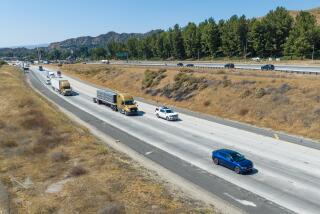Charity ‘Lemon’ Mills Can Leave Car Buyers With a Sour Taste
- Share via
In the name of charity, tens of thousands of defect-ridden “lemon” vehicles are being recycled into the used-car market, simultaneously defrauding buyers and the federal tax system, according to consumer advocates, auto experts and government officials.
Charitable organizations are making endless pitches for donations of used cars by direct mail, on the radio and in print ads. Just call a toll-free hotline and you can get rid of your clunker and benefit charity too, the ads say.
But a large percentage end up back on the used-car market, typically without any inspection or repair. Nobody is sure how many, because the system is unregulated and operates with a high degree of secrecy. In many cases, the named charity has nothing to do with the process.
“If there is a common characteristic of these programs, it is that many charities have abdicated responsibility for the things done in their names,” according to a training manual written for Internal Revenue Service agents.
More than 9 million vehicles are sold through wholesale auctions each year. Conservative estimates put the number of charity vehicles to be at least 2% of the total, or about 200,000. More than half are resold through wholesale and retail auctions, typically with little disclosure of their histories.
Consumer advocates and state regulators say these recycled charity vehicles represent high risks for consumers. The California Bureau of Automotive Repair does not have a role in regulating charity donations but says it hears about the problems.
“It’s buyer beware,” said Allen Wood, BAR’s chief of consumer affairs.
Here’s why: Experts say the typical donor elects to turn a vehicle over to charity after detecting a major mechanical problem not worth fixing. A faulty transmission might cost more than an older car is worth.
By donating it, the owner typically intends to take the full value listed by appraisal services such as Kelley Blue Book or Edmunds--a clear violation of IRS rules but one that many charity come-ons actively promote.
“Taxpayers are subsidizing schlocky cars getting back on the road,” said Rosemary Shahan, president of Consumers for Auto Reliability and Safety. The donors “take a tax break and then menace us by putting a bad car back on the road.”
“They use the credibility these charitable organizations have with the public,” she said. “Most people might think twice about donating to Rudy’s Auto Auction, but if it’s the American Heart Assn., they aren’t worried. By the time a car reenters the stream of commerce, the charity has washed its trail.”
Said Jeremy Anwyl, president of Edmunds.com: “Perhaps I am a cynic, but I expect that most donated cars are most likely to be those that would not sell easily--in other words, very rough units.”
For charities, the junker vehicle donation business is an important source of income.
Take, for example, the American Humane Organization, an old but somewhat obscure group whose mission is to prevent abuse of children and animals. The organization, not to be confused with the Humane Society, set up a vehicle donation program about a year ago and thus far has accepted 30 donations, a spokesman said.
The charity never sees the vehicles. Rather, its program is operated by a private contractor, Adesa Impact, a unit of Adesa Corp., which itself is part of Allete Inc., a publicly traded multi-industry conglomerate that has interests in the power, water and auto industries.
Adesa is the country’s second-largest operator of wholesale auctions, with auction yards in almost every major U.S. city.
The company operates its charity business out of a call center in Clinton, Maine, with toll-free lines for such charities as the American Heart Assn., the American Lung Assn., the National Kidney Foundation, Habitat for Humanity and the Children’s Cancer Research Fund.
Adesa directly handles about 45,000 vehicle donations every year, making it one of the largest such firms in the automotive industry, said Joseph Hern, who oversees the donor operation. Hern said the average age of the donated vehicles is 12 to 14 years and that they typically have high mileage and histories of several different owners.
Hern acknowledges that a portion of the charity vehicle market is characterized by taxpayers attempting to take improper write-offs and lemon vehicles being recycled onto the highways. Nevertheless, he said, many donors are motivated by altruism.
“To say this is a lemon mill oversimplifies it and doesn’t do justice to the programs that are well-run,” Hern said. “We return 65% to 80% of the value to charity, which is very strong in this segment.”
Vehicles are picked up from donors by tow services and sent to auction lots, including some of Adesa’s sites. But Adesa’s own wholesale auctions aim for a higher standard of vehicle, Hern said, so many of the cars end up in lower-end wholesale auctions.
About 40% of the vehicles are sold to salvage yards, he said, but scrap prices have plunged so low in the last year that the vehicles aren’t worth much in that marketplace either, Hern said.
Adesa is licensed and has a contractual relationship with the charities it serves, but in many other cases the private companies that run vehicle donation operations are untraceable. The Internet contains more than 18,000 pages that involve charitable car donations, but often the pages fail to list the company that operates the donation programs for the charities.
Allstate Car Donation Assn., for example, is listed on the Internet as allowing charity contributions in any of 48 states. Its call center is in Van Nuys, but managers there did not return calls seeking comment. A phone receptionist said only that proceeds go to the National Assn. for Alternative Medicine and the California Nonprofit Center for Living and Learning.
According to the National Auto Auction Assn., a trade group based in Frederick, Md., wholesale auto auctions hit $77.6 billion in 2000 on sales of 9.3 million vehicles. About 37% of the vehicles are leased or repossessed, and about 40% were consigned by dealers for auction. The association says about 3.5% are from other or unknown sources, which would include charity donations. Executives of the group acknowledge that wholesale auctions are one of the main methods by which donated vehicles are disposed.
“We don’t maintain any statistics, but we hear the same thing,” said Daniel Hallinan, assistant executive director, referring to problem vehicles. “We know it happens. We know it happens a lot.”
Some charities take a different route. The Salvation Army receives about 15,000 inquiries about vehicle donations a year in Southern California, the majority of which result in actual donations, said Dawn Marks, director of marketing. The cars are resold by the group at its thrift centers.
“We don’t do repairs,” she said. “We let the customers know these are ‘as is’ and they must inspect very carefully.”
For used-car shoppers, the best way to avoid trouble is to buy a vehicle with a known history. If you can’t find a car still under its blanket manufacturer’s warranty, seek one with a single owner who kept service records that show the kind of maintenance the car received.
*
Write to Ralph Vartabedian at Your Wheels, Business Section, Los Angeles Times, 202 W. 1st St., Los Angeles, CA 90012. E-mail: [email protected].







